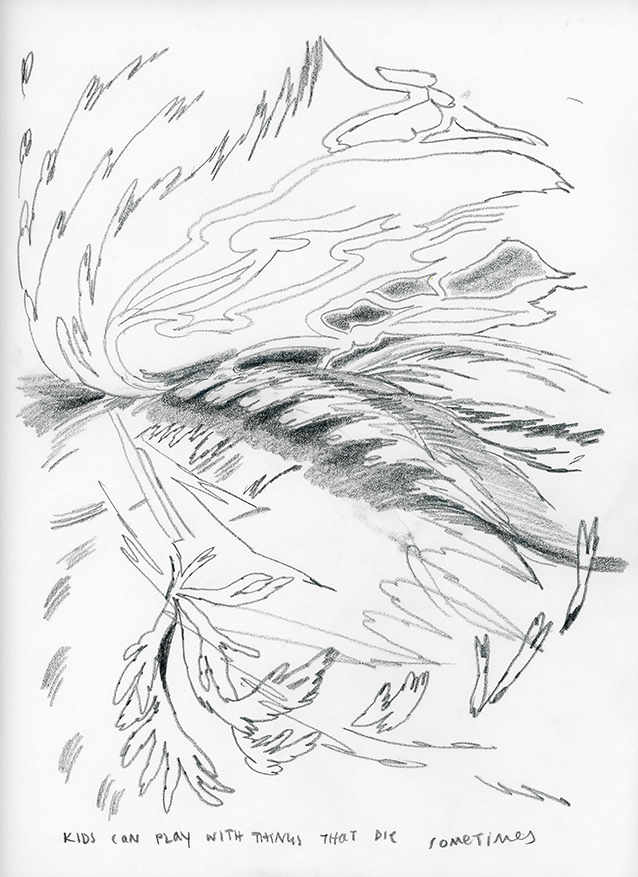ISSUE 04 / MARCH 2021
I love the beings who are walking and running – towards and away from me, all over the lawn and the walls of my building, across the beach and into the slowly waking forest, into the water, out of the water again, moving, moving, walking, running.
I love the people I see on my walks. I love those that say hello and those who do not – those who peer curiously into the faces and lives of every one they encounter, those lost to time and space inside themselves, those speaking loudly into their phones while racing by on bicycles and scooters and rollerblades. I love those that walk very slowly, accompanied by dogs – I love those coupled and those alone, those with and without shoes. I love those that pause to admire a flower, or to crane their neck to the sky towards something big, something felt, something that makes the sky seem like a fluttering curtain affixed to one's favourite window. I love those that are spilling into the world as they walk, those who are clear and warm as water. I love those that seem to look at nothing.
I love the robins and the northern flickers and the starlings all flitting through the empty rose garden. I love the furry moss-clad oaks and elms and their quiet, patient gaze. I love the crowns of these trees and their boughs, fingers, trembling in a wind that does always reach me. I love the mud that smooths itself against the curve of my foot. I love the tide, so eager, but never rushing, somehow, always moving at exactly the right pace. I love the sand on the beaches and in my shoes and my bed. I love my mother. I love my father. I love that I can make a phone call.
I love that there are people who like to feed the seabirds, stand in fluttering clouds of bodies tossing precious seeds. I love the flowers that the ocean carries away.
I love that being in the water feels like leaping into armfuls of sweetened glass. I love that spring is a stinky and colourful affair. I love touching the hands of the people whom I love.
I love the strange dreams that I have.
Through you, I am lighter. Thank you.
(CW: grief, death)
Every morning I go outside to dance or to walk along the water and it is impossible to leave unacknowledged the pain and discomfort and tragedy that also inform these spaces. People lie on the beach or in the parks I walk through. There is a fire in a building across the street from my own. There are crows tearing smaller birds to pieces along the water. There is so much one cannot possibly absorb. There is so much beyond this that remains hidden: there is so much that is purposefully obscured. It makes me want to hide, too, recoil and withdraw into my small inner space, as though that isn't just as similarly fraught and multiple.
It is disquieting (literally dis-quieting, a rupture of the stillness) and necessary to be put so closely in touch with the density of happenings in any space – all of this noticing carries through me as though every thing that I meet sends ripples through all the life-giving liquid I have moving through my body, as though they are cast stones – how are we to live honestly if we resist what is true, if our noticings are no longer felt?
~*~*~*~
I have wanted to write about this and do not know yet how to, but perhaps the most important thing is that I do at all.
On an early Wednesday morning last month, I was one of the people that found a person's body lying on the shore of a beach I walk along almost every day. They were wearing a jacket blue as the tree's shadows on the sand, blue as the sky and water. When I saw this person, I had been dancing. I felt shaken out of myself and scattered upon the ground like a handful of stones. There was someone else there with a calm and friendly face who called the police and made necessary arrangements.
I returned to that spot later in the week with flowers, apologizing to the person in the blue jacket for the unjust circumstances of their passing, and for my own lack of ability to stay with them. That afternoon, I came across videos online of the police officers that had arrived on the beach after I departed, posing and laughing and taking photos with the body of the person in the blue jacket. (I am purposely refraining from providing links to this material.) The dissonance felt enormous and almost impossible to reconcile. In how many ways do we splinter in the face of death and loss? In how many ways do we come together anew?
In all of this so much is illuminated: the insufficiency of our cultural containers for holding the complex feelings that arise in the face of death – the vastness of the material and spiritual strata that any place holds in terms of what life has met and danced and lost or transformed into within it (it is not a far leap from this conversation to point directly towards Canada's violent colonial history and the ways this has and will continue to warp both the land and the experience of those living upon it) – the unjust circumstances of a person's life made explicit in the conditions of their passing – my own inability to hold all of these thoughts without falling before them.
All bodies are deserving of dignity.
Grief, as I have been reminded recently through the teachings of death doula and educator Tracy Chalmers, is a natural consequence of our aliveness: suffering is what can happen when we do not give ourselves permission to feel it, and if we feel unsupported in our access of it. What if we could expand our grief? What if we could acknowledge its presence with a warmth and a curiosity, and know that it is necessary? What if we allowed our grief to turn?
There is so much to grief that has to do with acknowledging transition, acknowledging change (and change-as-god, potentially). Engaging with these feelings through active practices is one of the most tremendous acts of love we can offer ourselves and those around us. I am slowly learning that it is through this kind of loving attention that these feelings can be transformed and allowed to pass through us.
I am glad that I returned to that beach with flowers. One day soon, I hope, I will return there again to dance.
Softening the clutch is lessening resistance is opening to and being accepting of what is is forgiveness is a deepening of presence
The two sketches which collided into this piece
"A country is an argument against beauty.
Ocean Vuong: 'I want to insist that our being alive is beautiful enough to be worthy of replication.' How to be alive outside the affective register of the state, inside something less structurally sound, where to be lonely isn't to ruinate?
Not every melancholic is buried in his longing. I want a song or a poem or a myth to drape over me like a fourth layer of skin. To be a gust of life, a la Roland Barthes, pirouetting throughout the world -- how graceful!
Billy Ray Belcourt, A History of My Brief Body
Some other things:
I've been entranced by several lichens this month, including lipstick cladonia and frog pelt.
I have been learning about how slime molds solve problems and about how the existence and behaviour of mycelium destabilizes and takes out for a night of feverish dancing our understanding of fundamental concepts such as individuality and intelligence. (Entangled Life by Merlin Sheldrake is a rich source of insight on the subject!)
I have been learning more about why land acknowledgements have lost much of their meaning in our “progressive” spaces and what can be done about this – the value of any habit and ritual coming not only from their repeated practice but also their associative qualities (how our intentions and stated values are actually carried out in the spaces of our lives). As Chelsea Vowel writes in her piece on the subject, "what may start out as radical push-back against the denial of Indigenous priority and continued presence may end up repurposed as “box-ticking” inclusion without commitment to any sort of real change. In fact, I believe this is the inevitable progression, a situation of familiarity breeding contempt (or at least apathy)."
In short: what are we, as uninvited guests on stolen land, actually doing beyond the acknowledgement of these conditions? Here is a great introductory resource to familiarizing yourself with the land you are currently settled upon.
To investigate:
Decolonizing british columbia, an essay available freely through the anarchist library
A podcast with Francesca Maxime on embodied anti-racism
Here is a favourite vegan pancake recipe.
Is the one I love everywhere?
Thinking about the in-between, again, the negative space without which the positive would not exist, the room that makes a room a room (betwixt the furniture and the bodies which occupy it), thinking about the mirrored space within our own bodies and our own cells, the consciousness that allows things to come into being. Feeling lucky to be made up of so much emptiness. May things continue to come and go, for you -- may they be released when the time is right.
Warmly,








